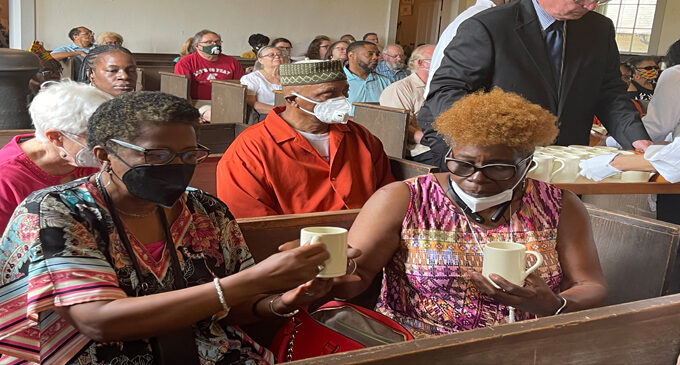St. Philips Moravian celebrates Freedom Day and 200th anniversary
Dozens of people attended the Freedom Day Lovefeast held at St. Philips Moravian Church last weekend.

Historic day precedes Juneteenth by a month
On May 21, 1865, over 800 enslaved people in the Village of Salem gathered at St. Philips to hear an announcement that would change their lives. On that day, General Orders No. 32 were read to the congregation which proclaimed that all enslaved people were free.
The order was read a month before enslaved people in Galvestone, Texas, received the news, which is marked by the annual Juneteenth celebration, read, “To remove a doubt which seems to exist in the minds of some of the people of North Carolina, it is hereby declared that by the virtue of the proclamation of the President of the United States, dated January 1, 1863, all persons in this State heretofore held as slaves are now free; and that it is the duty of the army to maintain the Freedom of such persons.”
Last weekend dozens of people sat in those same pews that were occupied at St. Philips more than 150 years ago to commemorate that historic day during the Freedom Day Lovefeast, hosted by Triad Cultural Arts, Inc. in partnership with Old Salem and St. Philips Moravian Church.
Moravian lovefeasts are modern versions of agape celebrations where congregations come together for special services. The service usually includes tea and biscuits or other baked bread, music and a brief message. Lovefeasts are held throughout the year to celebrate special occasions, such as Christmas and church anniversaries.
During the Freedom Day Lovefeast, the keynote address was delivered by Dr. Reginald Hildebrand, who encouraged those in attendance to think about what was going through the minds of the St. Philips congregation when they found out they were free.
Hildebrand, who is a retired African American Studies professor at Williams College, UNC Chapel Hill, and Durham Tech Community College, encouraged those in attendance to reflect on what it may have been like for the enslaved at St. Philips on that day in 1865.
“You can feel something walking into this building and seeing these pews,” Hildebrand continued. “On that day, in this place, in those pews, the prophetic scriptural injunction was made real and liberty was in fact proclaimed to the captured.”
Hildebrand said the words from the chaplain that afternoon probably sounded like a response to years of unanswered prayers to the enslaved people of Salem. “Hearing those liberating words would have hit you like holy fire and sounded like the sweet answer to fervent prayers,” he continued.
“This church had become a focal point of freedom and it is not hard to imagine what happened when the word went out from this place and the surrounding countryside. When a mother first heard that word, ‘free,’ she called her children to her and she looked at them knowing for the first time that those little eyes … could not be sold away from her … that’s what free meant. That’s why we celebrate this day.”
Other participants in the Freedom Day Lovefeast included retired District Court Judge Denise Hartsfield, Malishai Woodbury, the first Black woman to serve as chair of the local school board, and several members of St. Philip’s and of Home Moravian Church.
Founded in 1822, St. Philip’s is one of the oldest African American congregations in the nation and is celebrating its 200th anniversary this year. The church was founded as a place where enslaved and free people of African descent in the community of Salem could worship. Through the initial efforts of the Female Missionary Society of the Moravian Church, St. Philips Moravian is the oldest African American church in North Carolina, and the first African American Moravian Church.
In the decades since, St. Philips has been active in communities across Winston-Salem. In 1952 the congregation moved to the Happy Hill Garden area, where it remained until the construction of US 52 led to its move to Bon Air Avenue in 1967. In the 1990s, the congregation was involved with Old Salem in the renovation of the brick church, which was originally constructed in 1861. In June of 2019, the congregation returned to the brick church location, where they currently worship.
Longtime member and vice chair of elders at St. Philips, Dorothy Pettus, said that during morning service on that historic day in 1865, the congregation was told to come back that evening for an announcement, but they didn’t know why. While standing near the pulpit where the announcement was made, Pettus told the crowd to close their eyes and say “freedom.”









